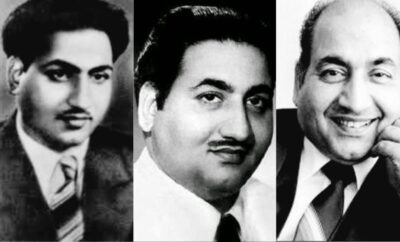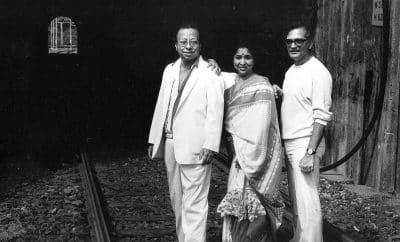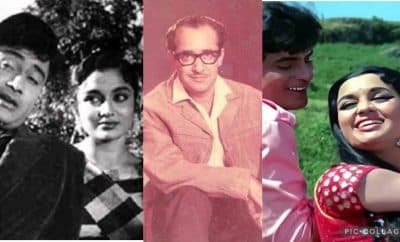Legends
Sahir’s Bhajans – Intense Prayers by an Atheist!
Lyrics are often a somewhat ignored element when we speak of a good composition. Mainly, the tune, the orchestration and the rendition by the singers leave a mark on our minds, more than the words. We tend to remember many songs due to their musical values, even if the lyrics aren’t so impressive. However, there are many golden era lyricists, whose lyrics are remembered as much as the music, if not more. For example, we remember Shailendra’s lyrics in many songs for a deep philosophy in simple words; we remember Gulzar’s lyrics, albeit abstract, because he has the ability translate our deep, incorporeal feelings into words; we remember Majrooh Sultanpuri’s lyrics because they convey seemingly ordinary messages in unique and astonishing ways. We cannot of course miss another eminent lyricist who certainly deserves a mention in this list – Sahir Ludhianvi.
Born as Abdul Hayee on 8 March 1921 in Ludhiana, Punjab, Sahir started his career as a lyricist in Hindi cinema in the late 1940s. Songs of Baazi and Naujawan (both released in 1951) proved to be a major career break-through for the composer S.D. Burman as well as for him. He kept on penning the quality lyrics for many memorable songs almost till he breathed his last on 25 October 1980. Though he worked with most of the golden era composers in his career spanning across three decades, his work with S.D. Burman, Roshan, Ravi, Khayyam and Datta Naik (N. Dutta) is remarkable.
As the lyrics of the film songs aren’t generally the result of a creative impulse of the lyricist and are made to order often at a short notice, many a time, there is a compromise on the poetic values. Sahir was however one of the few lyricists who had a strong poetic substance in their lyrics and never compromised on this front. He had an astonishing capability of touching others’ hearts through simple yet direct (and at times sharp) words. He translated into words emotions of various types – ranging from romance to break-up, patriotism to socialism, devotion to atheism – with equal proficiency. Only Sahir could prescribe a practical approach to break-up through Chalo ek baar phirse ajnabi ban jaayein hum dono (Gumrah – 1963) and Tum mujhe bhool bhi jaao toh ye haq hai tumko (Didi – 1959). Only he could describe the mesmerising bounties of nature in an equally stunning way through Surmai ujaala hai, champai andhera hai (Parbaton ke pedon par – Shagoon -1964). Only he could effectively express the eternal debate between spirituality and materialism through Sansaar se bhaage phirte ho (Chitralekha – 1964). Only he could express the delicate feelings of an adolescent girl in love through Thandi hawaayein (Naujawan – 1951) and the distress and pain of being a woman through Aurat ne janam diya mardon ko (Sadhna – 1958). Only he could express the hope about equality through Wo subah kabhi to aayegi (Phir Subah Hogi – 1958), express the comradely feelings of the farmers and blue collared workers through Saathi haath badhaana (Naya Daur – 1957) and raise pointed questions on the hypocritic social system through Jinhein naaz hai hind par wo kahaan hain? (Pyasa – 1957).
What’s more, Sahir adeptly describes various shades of devotion through his songs, though he himself was an atheist! Through some of his songs, he accepts the supremacy of the Almighty and states that only He is the ultimate refuge; for example, Aana hai to aa, raah mein kuchh pher nahin hai (Naya Daur – 1957), Tora manwa kyun ghabraye (Sadhna – 1958), Prabhu tero naam jo dhyaaye, phal paaye (Hum Dono – 1961), Hey rom rom mein basne waale Raam (Neelkamal – 1968) and Teri hai zameen, tera aasamaan (The Burning Train – 1980).
https://www.youtube.com/watch?v=d-l0T0fjoGM
https://www.youtube.com/watch?v=3BSqWhIXIUA
Through some of his songs like Allah tero naam, Ishwar tero naam (Hum Dono – 1961), Ishwar Allah tere naam (Naya Raasta – 1970) and Ram Rahim Krishna Kareem (Mehmaan – 1974), he states that the Supreme Being is only one, though called by different names in different religions, and prays for universal wisdom and universal wellbeing.
The song Banwari re, kaahe ko bhoole banwari? (Chingari – 1989) has an intense prayer to Him for help.
https://www.youtube.com/watch?v=SfWUKHMIyIc
Through some songs like Aan milo aan milo shyam saanwre (Devdas – 1955) and Aaj sajan mohe ang laga lo (Pyasa – 1957) he expresses the relationship between God and his devotees using the metaphor of Lord Kirshna and his lover.
Some of his philosophical songs stress the Karma Siddhanta (the principle of Karma) and highlight that we should not miss out on good deeds while enjoying the life, as we all are eventually answerable to Him; for instance, Laaga chunri mein daagh, chhupaoon kaise? (Dil Hi To Hai – 1963) and O prani re prani re, teri karam kahaani (Chingari – 1989).
In the song Kaam krodh aur lobh ka maara from (Bahurani – 1963), Sahir brings out the harsh fact that when even God cannot avoid the worldly pains and struggle when He reincarnates himself as a human being, we certainly cannot escape them. And through the famous bhajan Tora man darpan kehlaaye from (Kajal – 1965), Sahir narrates the superb philosophy that He lives nowhere else but within us and therefore, we should be answerable to ourselves, even if to no one else.
https://www.youtube.com/watch?v=xgMv6DqpN04
Who would say that all these prayers and philosophical bhajans are written by an atheist? They are no less in terms of intensity and appeal than the poetic works of believers. Only a true artist can vividly paint the pictures of the feelings that are foreign to him, and Sahir was one beyond any doubts!




Rajan Nebhnani
March 8, 2021 at 8:33 am
अति सुंदर ?? साहिर साहब की लेखनी में सामाजिक और जीवन जीने का संदेश होता था ?
Rajan Nebhnani
March 8, 2021 at 8:35 am
अति सुंदर ?? साहिर साहब के गीतों में सामाजिक और जीवन जीने का संदेश होता था ?
Arjun Narayanan
March 8, 2021 at 12:26 pm
Have often thought of this aspect of an atheist poet writing bhajan and Sahir has written many of them as you pointed out.
दिव्या शुक्ला
March 8, 2021 at 3:11 pm
Very well written
A K Chawla
March 8, 2021 at 8:18 pm
Excellent article indeed! Well researched and justifying greatness of Sahir Saab through his outlook and philosophy of life! Keep it up!
Madhupati Sharma
March 10, 2021 at 9:41 am
I have read a number of tributes to the best of progressive lyricist named Sahir Ludhiyanvi but this is true to the core what I feel. The songs selected are what I adore. Even mentioned songs convey the full caleidoscopIc view of his career.
Great efforts, language and style are added beauty in you writing.
Although philosophical, religious and secular too
the great thing about these songs is that they are superhits as in romantic category. Here lies the greatness of the lyricist.
By the way he is my favourite lyricist.